Mayo Clinic's approach
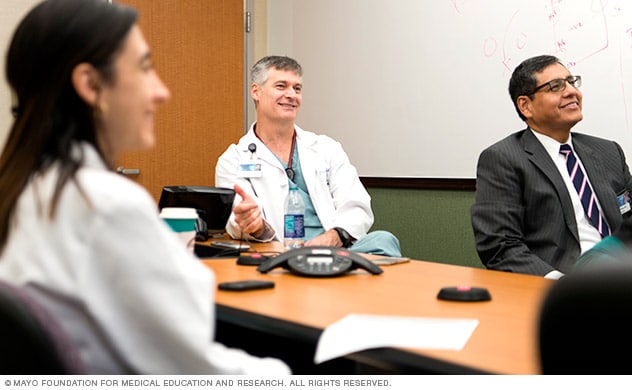 Team approach
Team approach
At Mayo Clinic, a team of doctors and staff work together to evaluate and treat people who may need lung transplants.
Multidisciplinary team approach
At Mayo Clinic, doctors trained in lung conditions (pulmonologists), chest surgery (thoracic surgeons), heart surgery (cardiac surgeons), infectious disease management, mental health conditions (psychiatrists) and other specialties may collaborate as a multidisciplinary team to provide you with coordinated, comprehensive care. Doctors work together with health care professionals in many areas to evaluate you, determine your eligibility for a lung transplant, perform your lung transplant and coordinate follow-up care.
 Care team roles
Care team roles
Health care professionals trained in many medical specialties work together as a team to ensure favorable outcomes from your lung transplant.
Common recommendations and treatment at Mayo Clinic
Mayo Clinic's Transplant Center staff at Mayo Clinic's campuses in Arizona, Florida and Minnesota works together to evaluate and treat people who may need a lung transplant. Mayo Clinic offers common recommendations, evaluation processes, treatment, post-surgical care and follow-up care for lung transplant candidates at Mayo Clinic's campuses in Arizona, Florida and Minnesota. Mayo Clinic uses technology to help make patient information available as needed at campuses in Arizona, Florida and Minnesota.
Mayo Clinic staff coordinates care as needed between the three sites. You may be evaluated for a lung transplant at one Mayo Clinic location, but you may have a lung transplant at another location if it's in your best interests. If you have your evaluation and transplant surgery at different locations, Mayo staff from both locations collaborates as a team to provide you with comprehensive care through the transplant process.
After transplant, pulmonary rehabilitation is offered at each Mayo Clinic campus.
Individualized approach
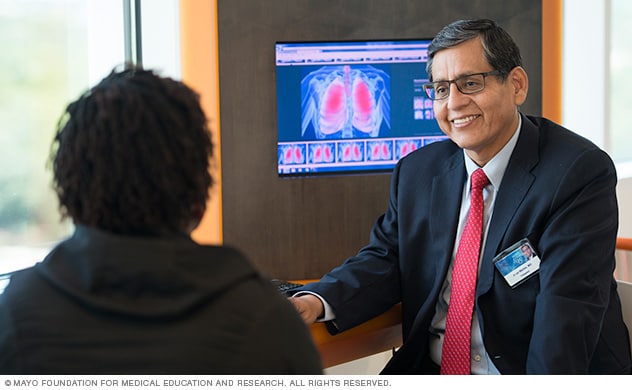 Individualized care
Individualized care
Mayo Clinic doctors take the time to discuss each person's individual needs.
Mayo doctors take the time to get to know you and work with you to provide exactly the care you need. Your doctors and transplant team will work with you and discuss your individual needs to determine the most appropriate treatment for you.
The opportunity to share your experience
Mayo Clinic has a Transplantation at Mayo Clinic Facebook page dedicated to helping transplant recipients and donors connect to each other online. Mayo Clinic also offers a Transplants group in Mayo Clinic Connect.
Multiorgan transplant experience
Mayo Clinic offers the full spectrum of options for lung transplantation, including multi-organ transplant procedures such as heart-lung transplantation. Mayo Clinic doctors and surgeons have experience evaluating and treating people with complex conditions who may need multiorgan transplants.
A team of doctors trained in a wide array of specialties works together in Mayo Clinic's Transplant Center to treat people who may need multiorgan transplants.
 Collaboration
Collaboration
Mayo Clinic doctors collaborate to provide care for people who may need lung transplants.
Research and innovation
Mayo doctors conduct research in diagnostic tests and treatments for a variety of lung diseases.
Mayo Clinic researchers in the Transplant Center conduct ongoing studies and clinical trials in improving surgical procedures, improving outcomes and caring for people who need transplants. Researchers also study alternative therapies for people who may not need a transplant.
For example, Mayo doctors study potential ways of using stem cell therapy to treat many lung conditions in lung regeneration research. Researchers study how reprogrammed stem cells can be turned into specialized cells that can replace, repair or regenerate diseased lung cells.
Mayo Clinic is also creating a lung restoration center with the goal of increasing the number of lungs available for transplant at Mayo Clinic and other transplant centers throughout the United States. At the lung restoration center at Mayo Clinic's campus in Florida, a team conducts trials hoping to preserve and restore donor lungs — using a method called ex vivo lung perfusion — so donor lungs that previously may not have been appropriate for transplant can be used in lung transplantation.
Work at the lung restoration center will support and extend Mayo's regenerative medicine research program.
Mayo Clinic researchers also study medications and treatments for people with lung transplants, including new medications (immunosuppressant medications) to keep the body from rejecting a lung transplant.
Mayo Clinic in Rochester, Minnesota, Mayo Clinic in Phoenix/Scottsdale, Arizona, and Mayo Clinic in Jacksonville, Florida, are ranked among the Best Hospitals for respiratory disorders by U.S. News and World Report.
The Mayo Clinic experience and patient stories
Our patients tell us that the quality of their interactions, our attention to detail and the efficiency of their visits mean health care like they've never experienced. See the stories of satisfied Mayo Clinic patients.
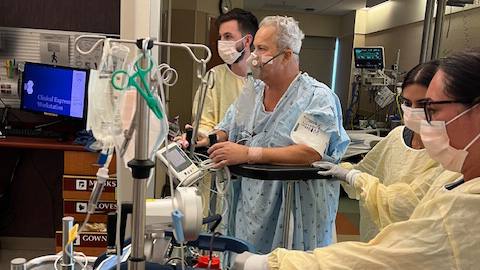
A journey of resilience and hope
Joshua Abelson, a 63-year-old aviation sales and supply chain professional, has faced numerous health challenges with remarkable resilience. Originally from Fort Worth, Texas, Joshua now resides in Jacksonville, Florida, where he continues to inspire others with his story. Joshua's transplant journey began in 2009 when he first noticed symptoms that led to a diagnosis of interstitial lung disease (ILD), specifically pulmonary fibrosis, after numerous X-rays and scans. This diagnosis marked the start of a long…
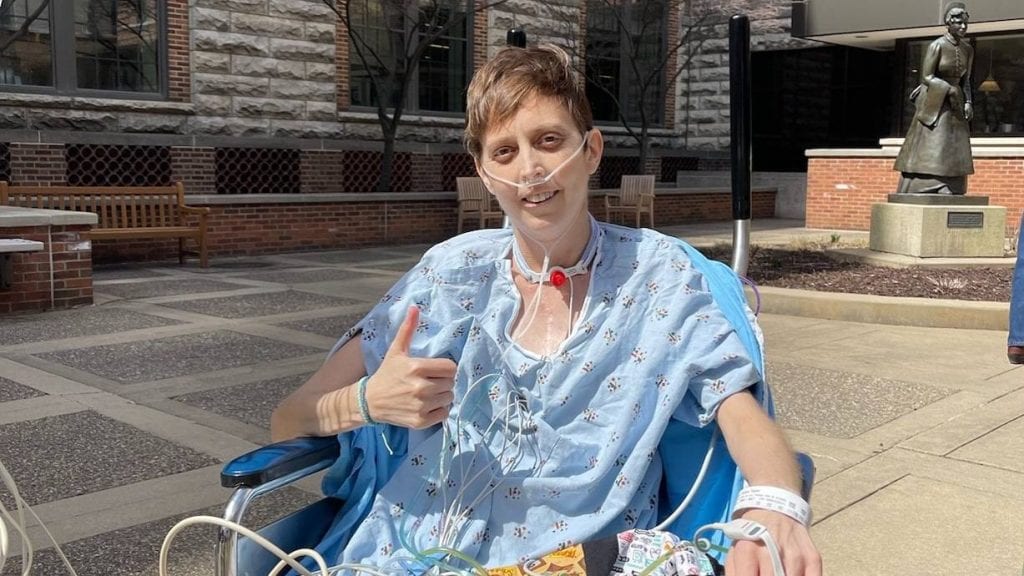
Britiny's team
Britiny Schultz Britiny Schultz can't wait for fall. A huge football fan, she's looking forward to cheering on her favorite teams. It's something many fans take for granted — not Britiny. She's able to keep cheering, thanks to her doctors at Mayo Clinic and the incredible gift of life from not just one, but two organ donors. Britiny and her nieces and nephews The South Dakota native says she closely follows two teams: "The Bison…
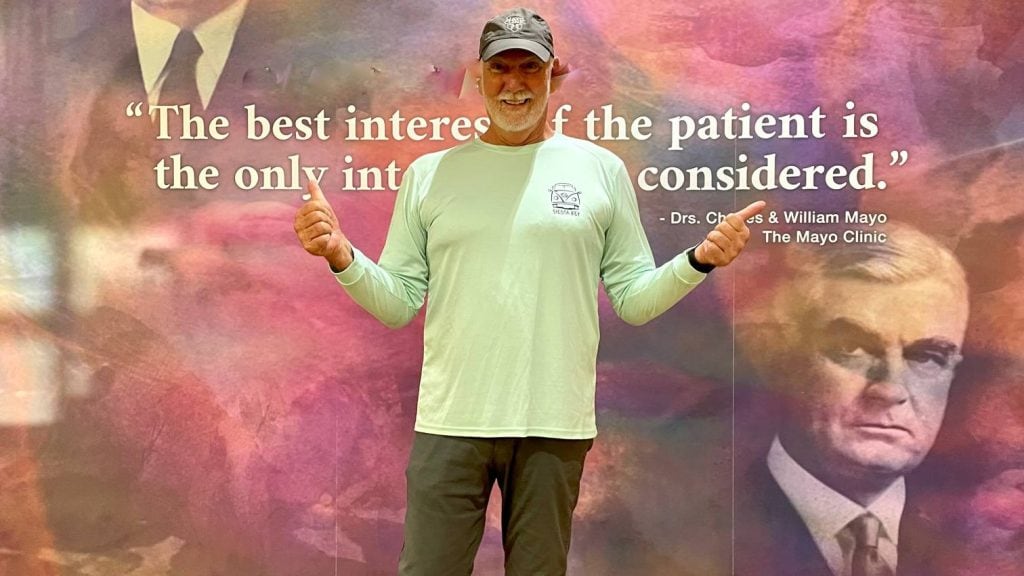
Celebrating transplant: A new life of song and service
Editor's note: The following was written and submitted by David Bradshaw. He shares his journey from COVID, to transplant to gratitude for a second wind, including the part Mayo played in his journey. Imagine sailing through life for 68 years — the picture of good health — without major illness, disease or hospital visits. That was my life ... until COVID-19 hit me in January 2021. What seemed like a bad case of flu morphed…
Expertise and rankings
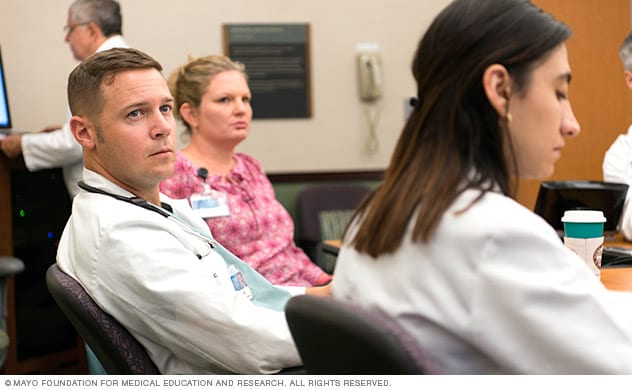 Team approach
Team approach
Mayo Clinic doctors and staff discuss care for people who may need lung transplants.
Lung disease experience
Mayo Clinic lung specialists and lung transplant surgeons have extensive experience evaluating and treating people with a variety of complex lung conditions.
Surgical expertise
Mayo Clinic lung transplant surgeons have experience performing lung transplant surgery to treat many lung conditions. Surgeons have expertise in performing single-lung transplants, double-lung transplants and multiorgan transplant procedures.
Volumes and outcomes
Mayo Clinic doctors' experience and integrated team approach result in transplant outcomes that compare favorably with national averages. Teams work with transplant recipients before, during and after surgery to ensure the greatest likelihood of superior results.
Volumes and statistics are maintained separately for the three Mayo Clinic locations. Taken together or separately, transplant recipients at Mayo Clinic enjoy excellent results.
Lung transplant outcomes compare favorably with the national average. Learn more about Mayo Clinic's lung transplant volumes and outcomes.
Locations, travel and lodging
The Village at Mayo Clinic in Phoenix, Arizona, offers low-cost housing for transplant patients and their caregivers.
The Gabriel House of Care in Jacksonville, Florida, offers low-cost housing for transplant patients and their caregivers.
The Gift of Life Transplant House in Rochester, Minnesota, offers low-cost housing for transplant patients and their caregivers.
Something went wrong
An error occurred, please try again later.
Mayo Clinic has major campuses in Phoenix and Scottsdale, Arizona; Jacksonville, Florida; and Rochester, Minnesota. The Mayo Clinic Health System has dozens of locations in several states.
For more information on visiting Mayo Clinic, choose your location below:
Costs and insurance
Mayo Clinic has dedicated transplant financial services representatives and social workers who can assist you with insurance and financial questions regarding your lung transplant.
Mayo Clinic works with hundreds of insurance companies and is an in-network provider for millions of people. In most cases, Mayo Clinic doesn't require a physician referral. Some insurers require referrals or may have additional requirements for certain medical care. Many insurance companies require you to get preapproval authorization prior to transplant services.
Read more about lung transplant costs and insurance at Mayo Clinic.
Clinical trials
Explore Mayo Clinic studies of tests and procedures to help prevent, detect, treat or manage conditions.
Aug. 24, 2024